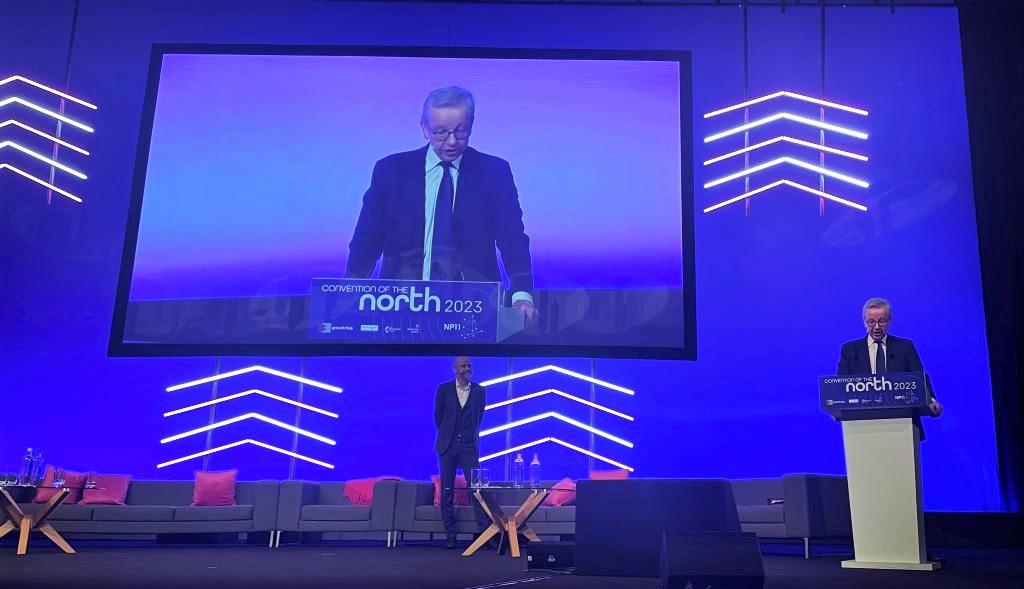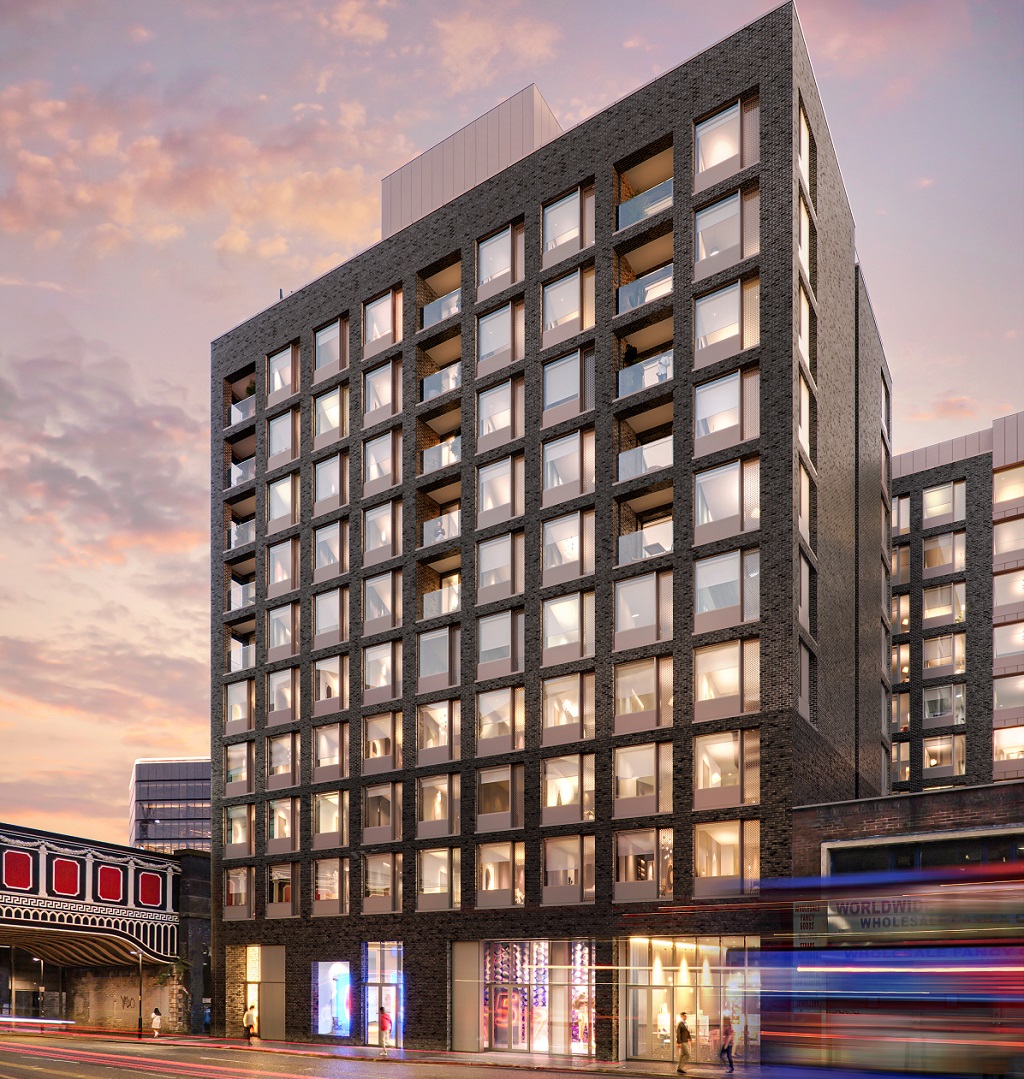Gove offers leaders hope at Northern summit
The secretary of state revived investment zones, promised increased devolution across the country, and defended the government’s maligned approach to levelling up at the Convention of the North in Manchester yesterday.
Investment zones back on the table
Prime Minister Rishi Sunak had seemingly scrapped the idea of investment zones after taking over from Liz Truss late last year. Truss had invited councils to express interest in the initiative, which would have seen areas earmarked for tax cuts and relaxed regulation.
Sunak now seems to have warmed to the idea, at least according to Michael Gove.
“We will shortly begin the process to identify investment zones in areas in need of levelling up,” he said.
It is as yet unclear whether the whole identification process will start from the beginning or if the government will pick winners from the expressions of interest it has already received.
The model for the investment zones is the regeneration of the London Docklands where Margaret Thatcher’s government “irrigated” the area to pave the way for “massive commercial investment”, Gove explained.
“The government created the environment. the private sector created the jobs.
“London Docklands today is an economic success story and it is that spirit which animates our levelling up policies and that spirit is there most vividly in our plans for new investment zones.”
Increased devolution for Greater Manchester and beyond
Greater Manchester Mayor Andy Burnham is currently locked in talks with the government in a bid to wrestle more power from Whitehall, particularly when it comes to housing and skills.
Gove cited the success of Greater Manchester’s housing investment fund, which has lent more than £400m for the delivery of more than 5,000 homes, as one of the reasons the government is open to giving Burnham more power.
“Both Andy Burnham and [West Midlands mayor] Andy Street, have used the mayoral model powerfully and effectively for their communities,” he said.
“It is because of this success that we are in talks to strengthen the hands of both mayors.”
The improved deal could see Burnham given more control of the affordable homes budget, as well as being assigned £30m to improve the quality of social housing across Greater Manchester following the death of Awaab Ishak in Rochdale.
“One of our key levelling up missions is driving the quality of homes across the country and making sure all homes are warm safe and decent,” Gove said.
“We know that poor housing kills. The tragic death of Awaab Ishak in Rochdale really enforced the need for action.”
Gove’s devolution crusade is not limited to Greater Manchester and West Midlands.
“I’ve been clear my ambition is to finish the job and give all parts of England have that want one a devolution deal by 2030. Soon 75% of the North will have a deal.
Gove spoke candidly about the need for devolution and said that Whitehall’s fear of ceding power to the regions was down to “being haunted by the need to demonstrate value for money at every turn”.
He also conceded that for too long the UK had been over-reliant on London and compared the country to a football team with a star striker but “a midfield that constantly struggles to get the ball upfield and a defence full of holes”.
“Not even Lionel Messi, can do it on his own. Success depends on strength in depth.”.
In defence of the Levelling Up Fund
“The more people discussing levelling up, the happier I am”, Gove said when referencing the backlash to last week’s LUF announcements.
Gove’s department was criticised for what is perceived as a piecemeal approach to boosting growth across the country, as many councils missed out on a share of the £2.1bn second round of the Levelling Up Fund.
“I don’t apologise for a moment for using vehicles like the Levelling Up Fund to invest additional government money in communities. We are active, engaged and committed across the country,” Gove said.
The Secretary of State added that the LUF was just one part of the government’s strategy solve regional inequalities, which also includes an increase in local government spending, £8bn in devolution deals, and cash from the Towns Fund and Future High Streets Fund.
He also confirmed there would be a third round of the LUF, to be announced after the March budget, but did not confirm how much that would be up for grabs.
Ahead of the Convention of the North, leaders had called for an end to the competitive bidding process that they say goes against the collaborative approach areas of the North are trying to foster.
While Gove said he was open to simplifying the funding methodology and “extending local government autonomy”, wholesale reform seems unlikely.
“I believe that a competitive process in allocating funding can help to drive innovation and ensure rigour in delivery,” he said.





Gove is the most effective member of the cabinet but talk is cheap. He is at least trying. However, those investment zones sounds suspiciously like those enterprise zones Thatcher used as a smokescreen, when she was bulldozing the North. What governments of all colours need to be asking is why working class children in Middlesborough are three times less likely to go to university that someone from a similar background in a poor London borough?
By Elephant
False promises
By Anonymous
How quickly old ideas are implemented, forgotten about, reheated and presented as new.
An investment zone is not the resurrection of an idea from the 1980s but of the 2010s when it was last reincarnated as an “Enterprise Zone”. Both Manchester Airport and Liverpool Waters are de-regulated enterprise zones boasting decent infrastructure and in the 10 years they’ve been around they’ve attracted limited private investment and done even less to rebalance the economy. Moreover it’s debatable whether what investment they have attracted would not have happened anyway, without the incentives.
Ultimately, there’s no substitute for sustained investment which to be fair to Gove he does acknowledge but as with the other essential ingredient, devolution, there’s no sign that government will pay more than lip service.
By Anon
The reality is Manchester is getting sustained investement, Liverpool isn`t, it`s largely the latters own fault because the city council is not business or development friendly,and the confidence built up after Liverpool One was developed has evaporated. There was also the shadow of Unesco, but even so Liverpool Waters has failed miserably to develop the Princes Dock area to it`s true potential.
By Anonymous
Manchester is getting sustained investment through its own successful initiatives – Upgraded public transport – trams and airport and reputation. Which has attracted further investment from private and the government.
By Anonymous
Gove offers leaders hope before running off straight after his speech? Sounds like he wants to do the talking and not the listening
By Levelling Up Manager